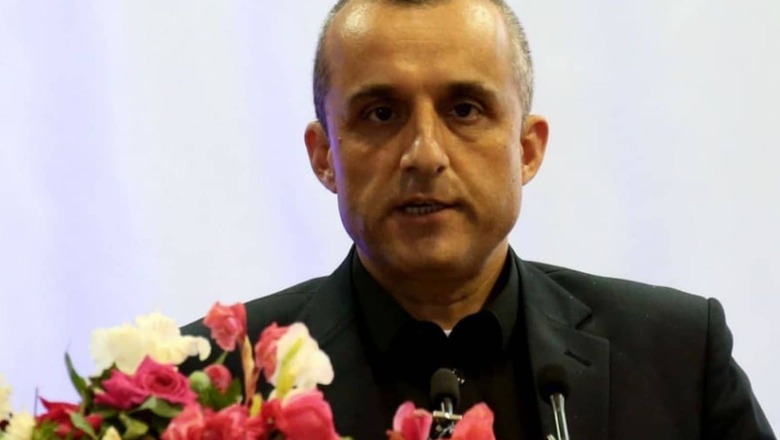
views
One cannot but admire Amrullah Saleh for his courage of conviction, strength of character and will, resolve and analytical acuity. As head of the Afghan Intelligence, later Interior Minister and then first Vice-President he has been a powerful opponent of the Taliban and has constantly exposed Pakistan’s close links with this obscurantist group.
Saleh has over the years steadfastly opposed any deal with the Taliban, accusing them of having no message, no vision except intimidation, stopping development and destroying pluralism. He has wanted them to be demobilised, disarmed, renounce violence, become part of the society, accept democracy and get reintegrated like the Northern Alliance, as that alone, in his view, would bring about lasting stability and prevent a Talibanised Afghanistan.
He has therefore opposed talks with the Taliban and a potential ceasefire to justify a speedy withdrawal of the US and its NATO allies as that, in his eyes, would neither bring peace to Afghanistan nor lead to the creation of a viable, pluralistic Afghan state. He has criticised the West for not making sufficient effort to create an umbrella anti-Taliban constituency, one not excluding the anti-Taliban United Front representing nearly 60 per cent of the Afghan population from the High Peace Council set-up, to lead the Afghan reconciliation process under presidents Hamid Karzai and Ashraf Ghani.
Saleh has, in the past, opposed Karzai’s reaching out to the Taliban. That outreach would explain the former president’s decision to stay on in Kabul after the Taliban take-over in the hope of promoting an inclusive transition government and avoiding reprisals. Abdullah Abdullah, half-Tajik and former adviser to Ahmad Shah Massoud, who led the High Council for National Reconciliation charged with leading the intra-Afghan peace talks with the Taliban has also stayed back to facilitate some kind of a power-sharing arrangement. This seems unlikely in the light of the easy capture of the country and its capital by the Taliban. The reported appointments of former Guantanamo Bay detainees with Al Qaida and terrorist links as Defence Minister and Central Bank Governor, not to mention the Haqqani group taking control of Kabul, point in this direction.
Saleh has been Pakistan’s bête noire since long. He has been a target of more than one assassination attempts, with close calls in July 2019 and September 2020. He has consistently blamed Pakistan for supporting the insurgency in Afghanistan and has challenged the West’s mistaken belief that Pakistan’s cooperation to work out a viable solution could be engineered through financial and other incentives. He has wondered, as others too have, as to why the US and NATO have remained unwilling to confront Pakistan. The reasoning that the US wants to keep an eye on Pakistan’s nuclear arsenal and the terror infrastructure in the country to prevent proliferation and nuclear assets falling into the hands of local extremists as well as collect information on terrorist threats emanating from Pakistani soil to US security is thin and unconvincing. The US has sanctioned China while maintaining a dense economic relationship with it, and has ties with Russia while sanctioning it repeatedly.
ALSO READ | Biden Bidding Hasty Retreat from Afghanistan or Biding Time? US Game Plan Will be Unveiled after August 31
The reluctance to impose “smart sanctions” on Pakistan remains a puzzle as its role in sustaining the Taliban insurgency by providing them safe havens is well known to the US policy makers. The US has suffered casualties in Afghanistan because of this, yet Pakistan has escaped any meaningful punishment. Even its status as a major non-NATO ally has not been withdrawn, much less sanctioning those in the ISI, armed forces and civilian establishment who have been involved in supporting the Taliban. Pakistan’s political establishment has celebrated the US defeat in Afghanistan, with Imran Khan himself welcoming the breaking of the shackles of slavery by the Afghans.
Pakistan’s Strategic Ambitions
Pakistan’s ambition of acquiring strategic depth against India by exercising control over Afghanistan through the Taliban is well known. The Taliban may be responsive to Pakistan’s expectations up to a certain extent, but are not likely to accept subservience and overlordship. The importance of the Islamic bond has its limitations as otherwise conflict between Islamic countries and even between Islamic sects would not be plaguing the Islamic world. Pashtun nationalism, the lack of full control by Islamabad of the frontier areas, tribal bonds, and now the Pashtun Tahafuz Movement—a civil and human rights movement—and, above all, the historical Durand Line issue are vexed questions to which only Islamic solidarity cannot provide an answer.
If the strategic depth has also an economic dimension now with General Bajwa’s emphasis on geo-economics, Pakistan could make some gains by way of energy supplies, but the real beneficiary will be China which, in reality, will be accorded, with the US ouster, more strategic depth by Pakistan.
The presence of LeT and JeM cadres alongside the Taliban and the threat emanating from the Haqqani group have to be assessed by India for its implications for our security. Beyond this, the dramatic victory of the Taliban risks to embolden Islamist radical forces in the region, including in Pakistan. The fall-out of this in Jammu and Kashmir in particular has to carefully appraised. It is moot if Pakistan will risk a conflict with India as Islamist terrorist groups cannot operate or introduce more lethal technologies in J&K without Pakistani backing.
Pakistan is both favourably and unfavourably placed after Taliban’s over-running of Afghanistan. The US, despite its stinging defeat, is still treating the Taliban as a legitimate entity and is negotiating with them currently for evacuating its nationals and some Afghans who having worked for the US are now in danger. Reportedly, the CIA chief has met the Taliban secretly in Kabul. Surprisingly, President Biden has rejected calls by other members of the G7 to delay the total withdrawal of the US troops beyond August 31 to give more time to other countries for withdrawal of their nationals as well as Afghans in good order. This is after threat of consequences by the Taliban if the US did not withdraw by the agreed date.
ALSO READ | Afghan Episode Has Exposed American Fickleness, India Would Do Well to Remain Invested in Russia
In his official remarks on the situation in Afghanistan, Biden has made no mention of Pakistan’s role in the US debacle. Russia has accepted the Taliban and views Pakistan’s role positively. China, of course, with its close ties with Pakistan sees it as a springboard for extending the Belt and Road Initiative’s tentacles into Afghanistan. Iran, despite stating earlier that an Islamic Emirate in Afghanistan would be a danger to Iran’s security, has not shown its hand so far.
Pakistan’s High-Stakes Game
Now that Pakistan has projected itself and is seen as a key player in bringing the Taliban to the negotiating table and the unfolding of developments in Afghanistan, it is burdened with the responsibility of influencing the Taliban positively so that excesses are avoided. Pakistan has been proclaiming that the Taliban of today are not the Taliban of yore, they are a reformed lot who will respect the rights of Afghans and seek inclusive governance.
Pakistan’s game is to gain time for the Taliban in the transition phase and work for their recognition by the international community by projecting a soft and changed face of the Taliban, which, once gained, will allow the Taliban to implement their real agenda in due course. The UK’s Chief of Defence Staff has bought General Bajwa’s assurances in this regard, cautioning the world not to treat the Taliban as an enemy. Now, if the Taliban commit the expected excesses, as they seem to be committing in the countryside already, particularly against women, and impose their religious obscurantism on the country, Pakistan as their principal supporter and propagandist will become the object of recriminations by public opinion in the West. Already, a spate of commentaries is appearing in the western press, even by some reputed columnists, as well as in social media calling for sanctions against Pakistan. The former US National Security Adviser, John Bolton, has added his voice to this in The Washington Post.
The Pakistani establishment cannot entirely prevent a blowback in Pakistan from the victory of the radical Islamist forces in Afghanistan. This includes the danger of refugee flows into Pakistan if there is continuing instability in Afghanistan. It is unlikely that the Taliban will act against the TTP (Tehrik-i-Taliban Pakistan) as much as Pakistan may expect. The Gulf countries now view Islamic radicalism and terrorism that accompanies Taliban very differently than in the mid 1990s. They are concerned about the Taliban’s success in Afghanistan leading to the emergence of a China-Pakistan-Afghanistan-Iran-Turkey axis.
The Central Asian countries would have their own concerns about the spillover effect of Islamist radicalisation and terrorism from Afghanistan into their own countries. They will expect Pakistan to exercise restraint. Pakistan will have concerns about the Financial Action Task Force (FATF) listing if it is seen as profiting from developments in Afghanistan to promote terrorism in South Asia. Already, the G7 chairs of foreign affairs committees have warned against “cross-border” terrorism flowing out of Afghanistan, including in South Asia.
The G7 Leaders Statement on Afghanistan on August 24, 2021 has expressed grave concern about the situation in Afghanistan and has called for adherence to obligations under international human rights law, including the rights of women, girls, and minority groups. It states that Afghanistan must never again become a safe haven for terrorism, nor a source of terrorist attacks on others. It warns that the Taliban will be held accountable for their actions on preventing terrorism, and that the legitimacy of any future government depends on the approach it now takes to uphold its international obligations and commitments to ensure a stable Afghanistan. Having resisted the bite, this bark may not impress the Taliban overly. No doubt a sane government in Afghanistan would want international acceptance and vital economic support to run the country, but this will mean a revival of western presence which the Taliban would not want, and then there is the China factor.
The latest act of Islamist terror at the Kabul Airport in which 13 US servicemen have been killed and 18 injured, and scores of Afghans killed and wounded is bad augury for future stability in Afghanistan. If the ISIS-K is behind these attacks, as claimed, it means that the Taliban are not in control of the situation and internecine conflict will continue and, given its ideology, the spillover from Afghanistan to neighbouring countries is likely. If the ISIS-K claim is false and it is factions within the Taliban that wanted to heap the last humiliation on the Americans and expose the limits of their choices to deal with the current situation, it also bodes ill for the future. Biden’s vow to make the perpetrators of the attack pay at a time of America’s own choosing is admitting that retaliation is not an immediate choice. This attack also shows the wisdom of our decision to temporarily close our embassy and withdraw our diplomats, contrary to criticism in some circles in India that we should not have done so.
Today, unlike President Ghani who flew out of the country, Amrullah Saleh, vowing to resist the Taliban, has found refuge in the Panjshir Valley, the redoubt from which Ahmad Shah Massoud had also withstood the full Taliban takeover of the country in the 1990s. While his courage is commendable, the chances of a successful resistance to the Taliban rule seem distant at present. To build the earlier Northern Alliance, the cooperation of Russia, Iran, India and Tajikistan is needed. The cards are not falling accordingly.
For the time being, wait and watch is the best counsel.
The author is Former Foreign Secretary. He was India’s Ambassador to Turkey, Egypt, France and Russia. The views expressed in this article are those of the author and do not represent the stand of this publication.
Read all the Latest News, Breaking News and Assembly Elections Live Updates here.




















Comments
0 comment